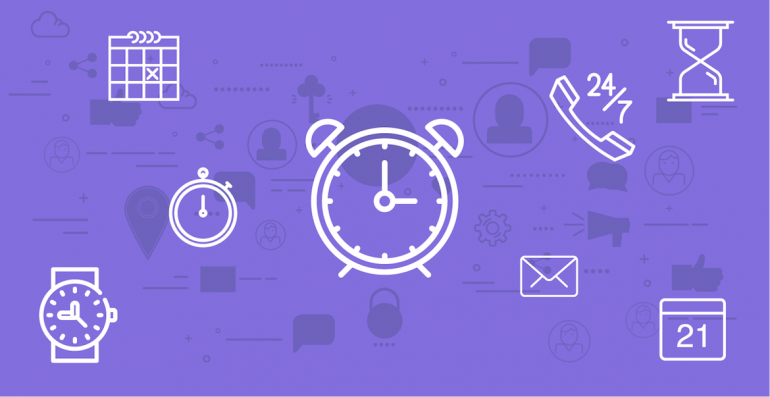One of the things that makes us all alike is time. And it’s funny because we are all so different in how we approach time, how we spend our time, how we deal with pressure and how we try to have more time.
I never thought that I will ever become a morning person. Now, I love waking up in the morning and be the first one at the office. I love that moment in the morning when I can manage my own time.
Managing time is an important lesson every entrepreneur or employee should learn. We all need to know how to prioritize the most important work, how to balance the urgent work vs the prioritized one and how to have small breaks so we don’t burn out.
The psychologist Philip Zimbardo has a great TED talk about the psychology of time. He says that happiness and success are rooted in a trait most of us disregard: the way we orient toward the past, present and future. So what did he suggest? To start calibrating our outlook on time as a first step to have a better life.
Struggling with time
And, honestly, there are days when I struggle with time too. I don’t have time to work on a specific project. I don’t have time to talk with my best friends. I don’t have time to take care of my health. I don’t have time to send an e-mail or even answer a phone call.
There are days in which I don’t have time for all the things I planned in the beginning of the week. And I’m almost sure you know what I’m talking about.
But what about the influencers in the marketing industry? What about the well known designers who work on big projects? What about the leaders in the content marketing field, entrepreneurs or even bloggers? How do they manage their time?
For these answers I contacted a few professionals and influencers and asked them to answer this specific question – What do you do in order to optimize your time?
You will see simple answers like “I get help” or “I shutdown my email” or “I wake up early in the morning”. Things that we all can do (only if we want).
So, here are the answers and if you like it, feel free to share it with your community and also let us know what you do in order to optimize your own time in the comment section below.
 Tobias Van Schneider
Tobias Van Schneider
” My approach is fairly simple, yet controversial because it doesn’t work for everyone.
1. I rarely network or do any networking events.
2. I started to just not answer my emails.
3. I focus on what’s important today instead of worrying too much about tomorrow. ”
Tobias van Schneider is a multidisciplinary designer & creative director born in Germany, raised in Austria and currently living and working in New York City.
 Debbie Millman
Debbie Millman
” I think one of the unfortunate ramifications of the technologically driven world we now live in is the speed in which we expect things to happen.
I believe we are now living in what I am calling a “140 character culture.” We’ve gone from writing letters to making phone calls to sending faxes and emails to typing out one line about this vast experience we call life. We can have instantaneous global conversations, immediate poll results and 15-minute viral sensations online. As a result we now want instant gratification of our hopes and dreams, but accomplishment and mastery take time and reflection.
The only “formula” for success is time and hard work.
We are living in a culture that when you graduate from college you are expected to know exactly what you want to do, where you want to do it and what your life plan will be. And if you aren’t successful right out of the gate, there must be something wrong with you. And this emotion builds into a palpable sense of hopelessness if you aren’t able to achieve something quickly. Anything worthwhile takes time. Mastery is a process of years. If you are one of the few souls in the world that are actually able to hit it out of the ballpark before you are 30, you might want to consider how you are going to be able to sustain that success over the long term.
The pressure to keep succeeding over and over will mount and you will likely feel that you must only hit the home runs. This is impossible. Take your time and build your skills. Consider what you really want—I call this your “non-negotiable”—the one thing that you can’t imagine not doing in your life.
Focus on that with intensity and try not to multi-task too much; multitasking is the enemy of productivity. Refine your methodology over time and give yourself the opportunity to grow and develop. Use your twenties to experiment. This is a time when falling flat on your face is expected. Build something meaningful rather than build something fast. The length of time it takes for you to succeed is generally a good measure of how long you will be able to sustain—and enjoy—it.
In thinking about the speed of success and maximizing your time, consider the following questions:
- What are you rushing for? Are you competing with yourself or other people?
- Are you in a race to succeed in order to feel better about who you are? Why do you think this will work?
- What would you rather have: instant unsustainable success wherein you become a has-been before 30, or a slow build to a meaningful career that has normal ups and downs?”
Debbie Millman is a designer, artist, author, educator, host of Design Matters, the world’s first + longest running podcast on design.
 Jay Baer
Jay Baer
” Every year when my team and I meet to work on our annual plans, we audit how I spend my time, and we find a way to replace 15% of my time with someone else. The key isn’t “saving” time, the key is spending your time only on the things YOU are uniquely qualified to do. ”
Jay Baer is a marketing consultant, speaker, and the author of the New York Times bestselling book, Youtility.
 Ann Handley
Ann Handley
“My biggest time-disruptor is email.
So I shut it off while I am “working,” and I batch and respond during non-working hours. Like Sunday mornings!”
Author. Marketer. Chief Content Officer | @annhandley
 Brian Peters
Brian Peters
In order to optimize my time I keep a list of “to-do’s” within my favorite tool, Dropbox Paper. Once I have my daily and weekly tasks written down I move the most pressing and important tasks to the top of the list. Then I get to work on them!
The key for me is to make sure that I turn off all other distractions when I’m in “deep work.” This helps me to be super productive and knock out things that need to be done. I usually do that in 30-40 minute increments. Once I’ve completed the crucial tasks I then move on to other tasks which are usually more fun and experimental.
Social Media & Marketing Buffer | Runner & Outdoorist
Daniel Gerrard
Managing time is an important lesson every entrepreneur or employee should learn. We all need to know how to prioritize the most important work, how to balance the urgent work vs the prioritized one and how to have small breaks so we don’t burn out. Some of us are drinking a lot of coffee, others are drinking energy drinks or getting early in bed.
Daniel Gerrard is the CEO of Addiction Helper
Dustin W. Stout

As a preface, a lot of how I operate is based on the GTD methodology. If you’re not familiar with it, I highly recommend looking into it.
Step one is to have a todo/project management list that I obsess over. Currently I use Todoist in order to organize all my projects and tasks. At the beginning of each day I see what needs to be done and what priority it has and begin working to get as much of it done as possible. If I know for certain I cannot get to something today, I move it to another day. At the end of the day, I revisit the list again and if any task is left, I move it to another day. I don’t finish my day without having an “inbox zero” for my todo list.
Step two is that I only work in 20minute intervals. Yes, that’s right, I never work for more than 20min straight. I then take a 1-3min break and go back to work. This is a modified approach to the Pomodoro Technique, which I also recommend reading up on. I use a timer that is ever present in the corner of my laptop screen. The app I use, Focus Booster, also allows me to track what I’m working on for that timeframe, so it doubles as a time tracker for projects with reports that I can easily access.
Not only does this light a fire under me by working against a clock, it also ensures that my eyes don’t suffer from looking at a computer screen for too long. Experts say that looking at a computer screen for longer than 20min at a time does significant damage to your eyesight. Since adopting this technique, I’ve experienced FAR LESS eye fatigue at the end of the day.
Step three is rinse and repeat daily. And that’s how I optimize my time.
Former actor/model turned international speaker, award-winning blogger, and entrepreneur. Co-founder WarfarePlugins. | @DustinWStout
 Jeff Bullas
Jeff Bullas
The best tactic I have discovered is to make sure that you time block, prioritize and commit to doing the most important work that will make a difference to your business everyday. Otherwise you can get trapped just doing the superficial and responding and reacting to everyone else’s demands and your inbox.
Blogger, Author | @jeffbullas
 Joe Pulizzi
Joe Pulizzi
“Make a list of all the things I’m doing that I’m not good at or don’t want to do.
Slowly, over time, find contractors to do those tasks so I can focus on what I’m good at and what I like to do. “
Content Marketing Evangelist | @JoePulizzi
 Sean McCabe
Sean McCabe
” I do three things to optimize my time:
I decide what I will accomplish the day before—usually three main things.
I try not to go into a day in reaction mode (avoid checking email or notifications first thing in the morning, so I’m taking ownership of the day and my priorities instead of responding to the world’s agenda for me).
I eliminate the possibility of interruptions. This means communicating with the people around me that I will be unavailable for specific periods of focus time.”
Sean McCabe — a hand lettering artist/type designer/illustrator — grew an interest in drawing typographic illustrations at an early age.
 Jacob Cass
Jacob Cass
“Optimizing my time comes down to priorities.
I ask myself what needs to be done first and how can I get other tasks moving along at the same time? I get my emails done and then look over my To Do list (in Google Tasks) which is ordered in order of priority. Then I get to it. “
Jacob Cass is the founder of ‘JUST™ Creative’. He works as a freelance graphic designer & blogger while traveling the world. On his website you will find his personal graphic design portfolio, as well as a blog on the main subject of graphic design and more.
 Emeric Ernoult
Emeric Ernoult
” Optimizing my time is all about making sure I only work on my top priorities.
That means that the first step to an efficient time management process is to know what your top priorities are. As these are constantly changing, this is a moving target I’m constantly re-evaluating, on a weekly basis, at least, sometimes on a daily basis. It’s so easy to get distracted! As the (male?) human brain hates multi tasking, I tend to define very few high priorities to make sure I don’t get swamped.
I use simple tools such as my phone to do list to always remind me of what’s important (I have a “productive week” list!). For team work, I use basecamp to follow-up on my team priorities to make sure we make progress week over week.”
Emeric is the co-founder of AgoraPulse
 Neal Schaffer
Neal Schaffer
“The key thing about entrepreneurs is the need to focus on the big things and not spend inefficient time on the little things. In order to that, I try to do these at all times to best optimize my time:
Delegate as much of my work to my staff as possible. The more I can do so, the more I can focus on the big picture
Manage emails efficiently. I use SaneBox and religiously try to get my Inbox as close to 0 as possible. I’m finally down below 150, but I was over 3,000 this time last year. At the end of the day, business still flows through email, so managing emails efficiently is key.
Manage time efficiently. You know you need time to work. However, others may want a piece of your time. I am religious about not scheduling external meetings unless I have an immediate need. If not I tell them to call me in a few months. “
Neal Schaffer is a social media speaker, social media strategy consultant, author of Maximize Your Social and founder of Maximize Social Business.
 Samwoo Ee
Samwoo Ee
“Going to bed at a certain time that ensures me a set amount of sleep.
I feel like this is the foundation to setting the timing for my day. If things go right, I notice myself processing things faster, having more efficient meetings and generally moving quicker throughout the day. It also allows me to consider working out, which adds to the benefits. If things go wrong, everything tends to get pushed back. Expectations aren’t calculated correctly and the affects are staggering. Also a big proponent for having an easy win at the top of your morning.
For example, making your bed, getting to inbox zero (sometimes not easy), or even doing 20 pushups. For me, this sets a pattern of success that subconsciously carries over to the rest of the day.”
Lead Product Designer for @Spotify. Coffee lover. Board game collector.
 Larry Kim
Larry Kim
” I have help. A nanny at home, an assistant at work, and a driver (Uber!). ”
Founder WordStream | @larrykim


 Tobias Van Schneider
Tobias Van Schneider Debbie Millman
Debbie Millman Jay Baer
Jay Baer Ann Handley
Ann Handley Brian Peters
Brian Peters Jeff Bullas
Jeff Bullas Joe Pulizzi
Joe Pulizzi Sean McCabe
Sean McCabe Jacob Cass
Jacob Cass Emeric Ernoult
Emeric Ernoult Neal Schaffer
Neal Schaffer Samwoo Ee
Samwoo Ee Larry Kim
Larry Kim

Daniel Futerman
December 6, 2016Awesome post Robert, lot’s of familiar faces here!
Fully relate to what Dustin said about having a daily task list and tackling that list until reaching an “inbox zero” each day. I do the exact same thing, and I know that it massively boosts my productivity.
I also use sticky notes for random reminders, headphones for avoiding distractions, learn as many keyboard shortcuts as I can, track my time, turn off all notification on my phone and computer (when I’m working), and more…
Thing is – time is worth money, so the more productive I am during my work hours the more I’m able to grow my business and income.
Mariana
February 28, 2017I’d like to find out more? I’d love to find out more details.